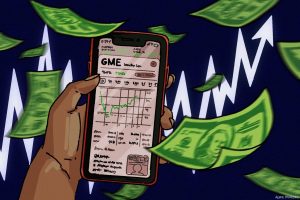Redditors’ takedown of Wall Street opens up pathways to a destroyed economy
February 5, 2021
As Millennials and Generation Z (Gen Z) have grown into active members of the market and economy, a highlight point of conflict has markedly risen to the forefront of generational dissonance — many place blame on the Baby Boomer generation for the fragile economy that Millennials and Gen Z must now attempt to fix.
Rightly so though, as when taking a look at the circumstances that have caused the conditions of the economy, many maneuvers aimed to put money into the pockets of the wealthy have come at the expense of everyday Americans.
In response, eligible Gen Z and Millennial investors have aimed to take down Wall Street — run by the Baby Boomers that left them stranded in a feeble economy. Yet, it feels as though Millennials and Gen Z fail to understand the hefty economic consequences that may arise from this attempt.
Whether or not you’re a direct investor in the stock market, you will see its effects in the economy you live in. While the economy and stock market are separate, their close relationship proves that they are intertwined in an interdependent relationship in most aspects; to put it shortly, almost always, if the stock market falls, the economy will too.
This relationship was particularly notable in The Great Recession of 2008 — at the same time as many investors saw upwards of 30% decreases on their investments, it was seen across the country that the economy was being chipped away at as home values decreased greatly, foreclosures swept the nation and unemployment rates hit record highs.
What Redditors now aim to do is deal pay-back to the wealthy Wall Street players that had a hand in occurrences like the recession. But what they fail to consider are the long-term consequences — economic volatility, large-scale market dysfunction and even financial crisis — of a domino-effect that may come as a result of this organized effort.
It’s true that much of America’s wealth is placed in Wall Street, but this wealth makes up part of the foundation of the global economy. Not only does it stabilize the national economy, but it upholds the same integrity internationally as much of the global market is dependent on the US. The stakes go beyond just Americans and into the countries that depend on US trade.
While the anger towards the capitalist system is understandable, the consequences of tampering with it expand far past emotion. The GameStop effort has been brief, and likewise, as was the drop in NASDAQ and S&P 500. However, if the effort was more widespread and on a longer run than it has been, it’s likely that affected stock exchanges would’ve seen longer runs of decline as well.
Yet in spite of the fact that the GameStop investors’ efforts have not taken a huge hit on the market and economy, succeeding efforts that may come as offshoots most certainly could.
More harmful undertakings are already being thought about on large platforms like TikTok. Just three days after being posted, one man who discussed in a TikTok a plan to collectively collapse the US banking system gained over 300,000 likes.
The ramifications of the GameStop Wall Street takedown have the potential to wreak havoc on an economy that we are shaping for ourselves.
Hypocritically, it seems as though Gen Z and Millennials may be following in suit of the Baby Boomers, as an unforeseen consequence of their rebellion potentially damages the very economy that they are trying to build for themselves and future generations to come.




